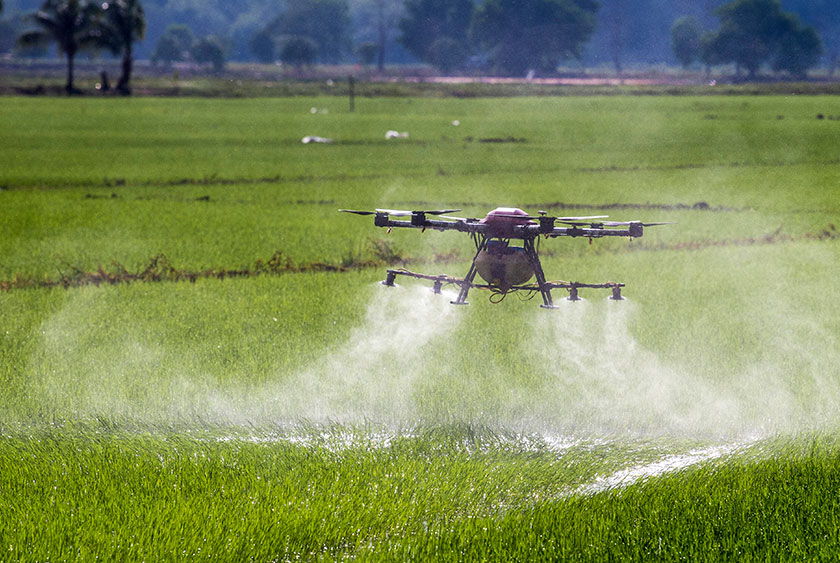In recent years, the agricultural landscape has undergone a technological revolution, with innovative solutions emerging to address the challenges faced by farmers. Auburn, a city deeply rooted in agriculture, has embraced cutting-edge technologies to enhance crop yield and ensure sustainable farming practices. One such technological marvel making waves in Auburn’s agriculture sector is drone spraying.
This article explores the pivotal role played by Drone Spraying in Auburn Alabama in boosting crop yields, mitigating challenges, and ushering in a new era of precision agriculture.
Challenges in Traditional Farming
Traditional farming methods have long been the backbone of Auburn’s agriculture, but they come with inherent challenges. One major concern is the efficient application of pesticides and fertilizers. Conventional methods often involve broad-spectrum spraying, leading to overuse of chemicals, wastage, and environmental repercussions. Additionally, the manual application of these substances is time-consuming and labor-intensive, contributing to escalating operational costs for farmers.
The Advent of Drone Spraying
The introduction of drone technology in agriculture has revolutionized the way farmers manage their crops. Drones equipped with advanced sensors, cameras, and precision navigation systems offer an efficient and targeted approach to crop management. In Auburn, the adoption of drone spraying has gained momentum, providing farmers with a powerful tool to address the shortcomings of traditional methods.
Precision Agriculture for Maximum Impact
Drone spraying in Auburn epitomizes the principles of precision agriculture. These unmanned aerial vehicles can precisely target specific areas of a field, delivering pesticides, herbicides, and fertilizers with unparalleled accuracy. The ability to control the dispersal of agrochemicals reduces waste and minimizes the environmental impact, addressing concerns about soil and water contamination.
Furthermore, drones can operate autonomously or be guided by farmers using GPS technology. This level of precision allows for customized treatment plans, ensuring that crops receive the right amount of nutrients and protection without excess or deficiency. The result is not only improved crop yield but also a more sustainable and eco-friendly approach to farming.
Time and Cost Efficiency
Drone spraying significantly reduces the time and labor required for crop management. Traditional methods involve manual labor for spraying, a process that can be time-consuming and physically demanding. Drones, on the other hand, can cover large areas in a fraction of the time, increasing the efficiency of farm operations.
Moreover, the reduction in labor requirements translates to cost savings for farmers. The initial investment in drone technology may seem significant, but the long-term benefits outweigh the costs. With fewer man-hours needed for crop management, farmers can reallocate resources to other aspects of their operations or invest in additional technologies to further enhance productivity.
Adaptability to Terrain and Crop Varieties
Auburn’s diverse agricultural landscape encompasses a variety of crops and terrains. Traditional farming methods may struggle to address the unique needs of each crop or adapt to different field conditions. Drone spraying, however, offers unparalleled adaptability.
Drones can fly at low altitudes, maneuvering through fields with precision and agility. This allows them to treat crops on hilly terrains or in areas with challenging accessibility. Additionally, the technology is not limited to a specific type of crop, making it suitable for Auburn’s diverse agricultural portfolio.
Data-Driven Decision Making
The integration of sensors and cameras on drone platforms facilitates real-time data collection. Drones can capture detailed information about crop health, pest infestations, and nutrient levels. This data is then analyzed to generate actionable insights for farmers.
By leveraging data-driven decision-making, farmers in Auburn can proactively address issues such as pest outbreaks or nutrient deficiencies. Early detection and intervention contribute to healthier crops and higher yields. The ability to monitor and analyze data in real-time empowers farmers with a level of control and insight that was previously unattainable with traditional farming methods.
Environmental Sustainability
A growing concern in modern agriculture is the environmental impact of farming practices. Excessive use of chemicals, water wastage, and soil degradation are pressing issues that need to be addressed for the sake of long-term sustainability. Drone spraying emerges as a solution that aligns with environmental conservation goals.
The targeted application of agrochemicals minimizes the overall usage, reducing the risk of contamination in soil and water bodies. Furthermore, the efficiency of drone spraying contributes to water conservation, as the technology can be programmed to optimize the use of water resources during the application process. Auburn’s agricultural community is increasingly recognizing the importance of environmentally sustainable practices, making drone spraying a key player in this shift toward eco-friendly farming.
To know more about agriculture drones visit our recent blog posts.
The Final Verdict
Drone spraying has emerged as a transformative force in Auburn’s agriculture, addressing longstanding challenges and ushering in an era of precision farming. The technology’s ability to enhance crop yield, reduce operational costs, and promote environmental sustainability positions it as a cornerstone of modern agricultural practices. As Auburn’s farming community embraces the advantages of drone spraying, the city is poised to lead the way in demonstrating the immense potential of technology-driven solutions for a thriving and sustainable agricultural future.
You may also like
-
From Drab to Fab: Inspiring Before and After Kitchen Cabinet Transformation Stories
-
Dance and Delight: Finding the Perfect Israeli Wedding DJ for NYC Receptions
-
The Big Decision: Sony vs Samsung TV Buying Guide
-
Things to Consider When Buying HP Laptops
-
Babies Rub Their Faces: A Mysterious Infant Behavior

